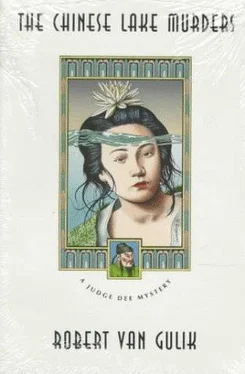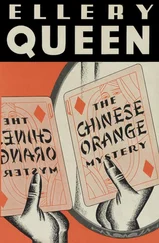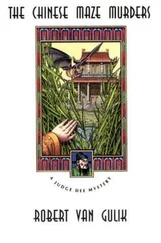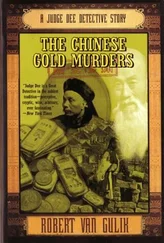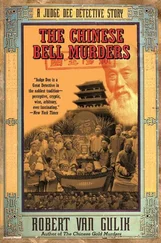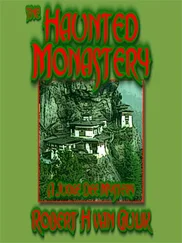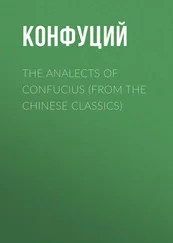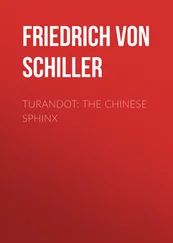"When he had read this, Liu probably began by assuming it only represented the vagaries of an old man's mind. But he decided that it might be worthwhile to visit Han-yuan, in order to verify whether Hermit Han perhaps actually executed his plan. Liu arranged for Han Yung-han to invite him to stay in his house for a week or so. Then Liu found out that Han knew nothing about his ancestor's plans. Han only knew about Hermit Han's instruction that the Buddhist Chapel should never be closed, and that a lamp should be kept burning there always. Han thought that this was a proof of his ancestor's piety, but of course the Hermit's real intention was that his descendants should have access to the secret entrance at all times of day and night, to cope with any sudden emergency. One night Liu must have paid a secret visit to the chapel. Then he found that the crypt and everything else really existed, just as the Hermit had described. Liu must have realized that the sudden demise of the old Hermit had prevented him from divulging the secret to his eldest son, Han Yung-han's grandfather. But the printer of the chess handbook published the manuscript exactly according to Hermit Han's draft, including the last page with the enigmatical chess problem. No one except Liu Fei-po, and probably the dead dancer, ever knew that the problem was nothing but the key to the letter lock in the Buddhist Chapel."
"The Hermit was an exceedingly clever man!" Tao Gan exclaimed. "The fact that the chess problem was published guaranteed that this key would never be lost; yet no uninitiated person could ever guess its real meaning!"
"Indeed," Judge Dee said, 'Hermit Han was a wise and very learned man, a man I would have liked to have met! But to continue. Now Liu Fei-po had in the Han treasure the enormous capital needed for organizing a nationwide conspiracy, and at the same time he had at his disposal an ideal place to serve as secret headquarters and council room of the movement. He built a villa on the empty lot in between the Han mansion and the residence of Councilor Liang, and had four workmen make the subterranean passage connecting the crypt with his own garden. I assume that thereafter Liu himself killed the four unfortunate workmen, since we found the bones of four men in the secret passage.
"However, as the plot expanded, Liu's expenses increased. He had to send substantial bribes to corrupt officials; he had to pay bandit leaders and supply them and their men with arms. Liu's own capital and the Hermit's treasure melted away, and he had to look for other sources of income. Then he conceived the plan to appropriate the wealth of Councilor Liang. He used to walk with the old man in his garden, and it was easy for Liu to make himself familiar with the Councilor's habits and those of his small household. About half a year ago he must have lured the old man into the secret passage, and there murdered him. He placed the body in a coffin there, where Tao Gan and I found it. From that time on the 'Councilor' became ill, his eyes grew worse, he became forgetful, and began to pass the greater part of his time in his bedroom. All this camouflage enabled Liu Fei-po to play his double role. He must have disguised himself in the crypt, then crept through his own garden into the Councilor's house. The rooms occupied by the secretary, Liang Fen, were located at the other end of the compound, and the old couple who acted as servants were really in their dotage; thus everything was favorable for his impersonation. Sometimes, however, unforeseen circumstances obliged him to act his part longer than anticipated. This, together with Liu's attending meetings of the White Lotus council in the crypt, explain his 'vanishing tricks,' which began to attract the attention of the members of his household-as related by the palanquin bearer to Sergeant Hoong.
"Together with his henchman Wan I-fan, Liu made a careful study of the Councilor's properties, and then they began to sell out his estates. In this manner Liu obtained the funds he needed for completing the preparations for the insurrection. Everything went well. He began to consult with his confederates about a suitable time for action. Just then, however, there came trouble. It started in Liu's private life. This brings us to the courtesan Almond Blossom, or, to call her by her real name, Miss Fan Ho-i."
The boat was lying still now. Ma Joong had seated himself, cross-legged, in the stern. He and the three others listened intently to the judge. Judge Dee pushed the sun hat back from his forehead. Then he spoke.
"The conspiracy had spread also to Shansi Province. A landowner in Ping-yang, called Fan, became a member. But later he repented, and decided to denounce the plot to the authorities. The White Lotus came to know about his plan. He was forced to commit suicide, after they had compelled him to sign a forged document in which he confessed to having commited a crime against the State. All his possessions fell into the hands of the White Lotus; his widow, his daughter, Ho-i, and his infant son were reduced to the state of beggars. His daughter thereupon sold herself as a courtesan. With the money thus obtained her mother could purchase a small farm in Ping-yang, and later Almond Blossom sent her regularly the greater part of her earnings, for the education of her small brother. These data I found in the report which the secret agents sent in yesterday from Ping-yang, after they had apprehended and questioned the local leaders of the White Lotus.
"The rest of her story can be easily reconstructed. Before her father died he must have told her something about the plot, including that the headquarters were located in Han-yuan, and that Liu Fei-po was the chief. The courageous and loyal girl then resolved to avenge her father, and to expose the conspiracy. That is evidently why she insisted upon being resold in Han-yuan, and why she accepted Liu Fei-po as her lover. Her aim was to extract from him the secrets of the White Lotus, then to denounce him and his fellow plotters to the authorities.
"She was a woman of a strange, haunting beauty, and she had an exceptionally strong personality. I think that her family was one of those for which Ping-yang is well known, where there are transmitted from mother to daughter abstruse secrets regarding the exercise of occult powers. Yet I doubt whether she would have succeeded in binding such an utterly egoistic and ambitious man as Liu Fei-po to her, were it not that she bore a striking resemblance to Moon Fairy, Liu's own daughter.
"I don't pretend, my friends, to be able to understand and analyze the dark vagaries of human passion. I confine myself to stating that Liu's love for his daughter was mingled with a feeling that, according to our sacred social order, a man may harbor only for a woman not related to him by the ties of blood. Liu's passionate love for his daughter was the only vulnerable spot in his cruel, cold soul. He must have fought his guilty passion with all his might; his daughter never knew about it. I don't know how much this passion affected his relation with his wives, but I wouldn't be surprised if his home life had been a very strained and unhappy one. However this may be, his love affair with the courtesan must have afforded Liu an escape from the conflict that was raging in his soul, and that gave the liaison a depth of passion that Liu could probably never have experienced with any other woman.
"During their secret meetings-it has now transpired that these took place in a pavilion in the garden of Guildmaster Wang -Almond Blossom learned from her lover several facts about the White Lotus, including the secret meaning of the chess problem. Liu wrote her love letters. He had to give vent to his obsessing passion, even in writing. But he was sufficiently clever not to write those letters in his own hand. He imitated that of Liang Fen, the Councilor's secretary, with which he had become familiar through his study of the Councilor's financial documents. Heaven knows what perverse whim made Liu sign those love letters with the pen name of Candidate Djang, his daughter's lover. I repeat, those dark impulses are beyond my comprehension.
Читать дальше
